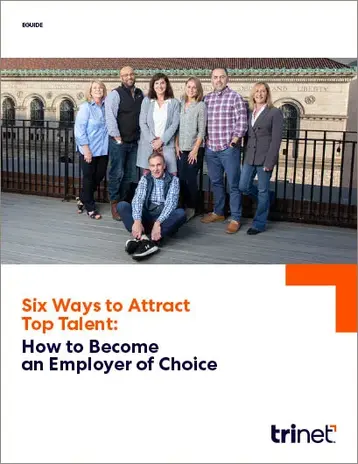Supporting Employees with Disabilities: What You Need to Know

Table of contents
- 1.Why is National Disability Employment Awareness Month important?
- 2.What should employers do?
- 3.Celebrating Employees with Disabilities
NDEAM can trace its origins back to 1945, when Congress passed a law “to establish the first week in October of each year as National Employ the Physically Handicapped Week,” and after a few iterations over the years, we have the celebration of employment and workplace equity, and of employees with disabilities that NDEAM represents today.
Why is National Disability Employment Awareness Month important?
In addition to highlighting the many contributions of people with disabilities, this month’s spotlight serves as an opportunity to reflect on strides taken over the years to support their success in the workplace. It also reminds us that there may still be opportunities to bridge some gaps to ensure access and equity are achieved. And this month is particularly special as it falls within the 50th anniversary year of the Rehabilitation Act of 1973. You can learn more about its impact here.
In February 2023, the United States Bureau of Labor Statistics released a summary of labor force characteristics of people with disabilities based on 2022 data, and a few noteworthy highlights include:
- Age concentration - 50% of all persons with a disability were age 65 and over (nearly three times larger than the share for those with no disability).
- Accessing and maintaining employment - Across all age groups, people with a disability were much less likely to be employed than those with no disability. The unemployment rate for people with a disability was about two times higher than the rate for people without a disability.
- Path to entrepreneurialism - Employed persons with a disability were more likely to be self-employed than those with no disability.
What should employers do?
An employer’s first focus must be establishing and maintaining a compliant workplace. Public and private employers largely focus on five important federal laws that protect individuals with disabilities from discrimination in employment and the job application process:
- Americans with Disabilities Act
- Rehabilitation Act
- Workforce Innovation and Opportunity Act
- Vietnam Era Veterans' Readjustment Assistance Act
- Civil Service Reform Act
Applicability of these laws on an employer depends on a number of variables, including the number of employees, whether federal contracts or sub-contracts are held, and whether the employer is public or private. Moreover, there are also state and local requirements that may be applicable to an organization. Use NDEAM as a great reason to check in with your internal or external trusted advisors (or both!) to understand how you might be able to enhance your compliance efforts.
Celebrating Employees with Disabilities
Employers and employees alike can learn more about how to participate and promote NDEAM messages throughout the year by reviewing this helpful guide from the U.S. Department of Labor site. Here are a few ideas that might resonate:
- Host an internal event (or a series) focused on teaching employees about subjects related to people with disabilities by inviting external speakers or hosting your own internal dialogue with employees.
- Highlight benefit options provided that support those with disabilities.
- Review internal policies or programs that promote equality and equity for people with disabilities to make sure they are up to date with best practices and compliance requirements.
- Promote volunteer opportunities and encourage focusing on your organization’s corporate social responsibility efforts that prepare individuals with disabilities for work.
- Consider whether and how your talent acquisition teams are increasing access and opportunity for people with disabilities at your organization.
As noted in the Bureau of Labor Statistics report previously cited, people with disabilities often find themselves gravitating towards a path to self-employment, as founders and entrepreneurs. In addition to many of the challenges all entrepreneurs face, such as accessing capital, competition for top talent, and adapting to shifts in the economy, individuals with disabilities may also face additional barriers such as lack of mentoring options, access to social support, and space.
Despite these obstacles, there are many notable and successful creators, founders, and entrepreneurs with publicly disclosed disabilities, including:
- Stephen Hawking, a world-renowned physicist, was diagnosed with amyotrophic lateral sclerosis (ALS) at the age of 21. He went on to become a professor at the University of Cambridge and the author of several bestselling books.
- Arunima Sinha, a mountaineer and former national volleyball player for India, was injured in a train accident and lost her leg. Sinha eventually became the first female amputee to climb Mount Everest and has since published a memoir detailing her experience.
- Dr. Vint Cerf, known as a co-designer of the Internet, has experienced hearing impairment since childhood. Dr. Cerf has had a lengthy and influential career in computer science, currently serving as vice president and Chief Internet Evangelist for Google.
These are just a few examples of individuals with disabilities who have made an impact across a wide spectrum of industries. If you want to learn more, check out our previous blogs celebrating the superpowers of Black entrepreneurs as well as neurodiversity awareness in the workplace. Active or aspiring entrepreneurs can find additional resources on TriNet’s Historically Underrepresented Businesses page.
Even after NDEAM comes to a close, take the time to consider how your organization focuses on people with disabilities in your workplace. Whether you are looking to expand recruitment talent pools, understand compliance requirements, or simply improve support for employees with disabilities, having the right HR provider, like TriNet, can help your organization to embrace diversity in all forms. You can learn more about how TriNet can help and support your business here.
© 2023 TriNet Group, Inc. All rights reserved. This communication is for informational purposes only, is not legal, tax, medical, or accounting advice, and is not an offer to sell, buy or procure insurance. TriNet is the single-employer sponsor of all its benefit plans, which does not include voluntary benefits that are not ERISA-covered group health insurance plans and enrollment is voluntary. Official plan documents always control and TriNet reserves the right to amend the benefit plans or change the offerings and deadlines.
This post may contain hyperlinks to websites operated by parties other than TriNet. Such hyperlinks are provided for reference only. TriNet does not control such web sites and is not responsible for their content. Inclusion of such hyperlinks on TriNet.com does not necessarily imply any endorsement of the material on such websites or association with their operators.

TriNet Team
Table of contents
- 1.Why is National Disability Employment Awareness Month important?
- 2.What should employers do?
- 3.Celebrating Employees with Disabilities





